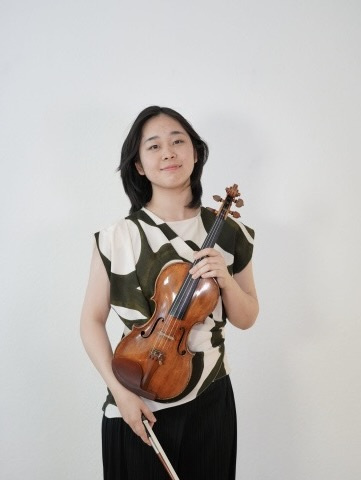EMIRI KAKIUCHI
EMIRI KAKIUCHI
19 year old violinist won second prize and three special awards at the 42nd Rodolfo Lipizer International Violin Competition in 2023 as its youngest participant, later giving a recital in Italy. She has also won first prize at the 70ch All-Japan Student Music Competition (Nagoya), second at the Grumiaux International Violin Competition, and was a finalist at the Louis Spohr Competition. Other honors include fourth prize at the 93rd Japan Music Competition and both first and audience prizes at the Munetsugu String Quartet Competition. She regularly performs with her brother Kyota Kakiuchi, including their 2023 debut at Munetsugu Hall and at the GIFU-KANO International Music Festival with Berlin
Philharmonic members. A former principal second violin of the Super Kids Orchestra led by Yutaka Sado, Emiri studied at the Yehudi Menuhin School under Akiko Ono and now studies at the Berlin University of the Arts with Professors Nora Chastain, Victoria Wong and Vineta Sareika. She performs on a 1725 Santo Serafin violin.
1. Was there a specific moment or experience that made you realize you wanted to become a musician?
1. I was about fifteen when I attended a concert at the Yehudi Menuhin School, and I heard Sasha Sitkovetsky perform the Franck Sonata. That evening was transformative for me—it was the first time I truly understood the emotional power of music. Until then, I had approached music as something to be practiced, perfected, and performed. I loved playing, of course, and I appreciated the beauty and complexity of the repertoire I was learning. But that performance changed everything. Sitkovetsky’s playing wasn’t just technically brilliant; it was profoundly expressive. The music didn’t feel like a performance—it felt like an outpouring of emotion, a direct and unfiltered connection between the musician and the listener. I remember sitting in the audience, completely still, hardly breathing. It was as though the music had reached inside me and unlocked something I didn’t even know was there. I felt seen, moved, and completely absorbed. The sonata spoke in a language beyond words, and it said something deeply human. That moment has stayed with me ever since. It was a turning point—a moment of absolute clarity. I remember thinking, This is what I want to do. I want to make people feel like that. I wanted to understand how to use music not just to impress or entertain, but to reach people on that same emotional level. That performance showed me what was possible—that music could be more than notes on a page or sounds in a room. It could be a lifeline, a mirror, a shared emotional experience. It was then that I began to see music as a form of communication, and my relationship with it has been guided by that idea ever since.
2. When you perform, what do you hope to communicate or make the audience feel?
2. Whether it’s joy, grief, awe, tension, or laughter, I'd want to create space for people to feel something deeply. Emotions are how we remember moments.
3. If you had to present yourself by playing a single piece from the entire repertoire, which one would you choose, and why?
3. Mendelssohn’s String Quartet No. 6 in F minor, Op. 80, is a deeply moving and powerful work that never fails to stir something profound within me. Every time I play it, I’m struck by how vividly it captures the raw emotion of human experience grief, anger, longing, and, at times, fleeting moments of hope. Composed in the aftermath of his sister Fanny’s death, Mendelssohn poured his heartbreak and anguish into this quartet, and that emotional intensity resonates through every note. What makes this piece particularly meaningful for me is how it draws out the chemistry within my quartet. There’s a shared sense of purpose and deep emotional connection that arises when we perform it together. The urgency of the opening movement, the haunting lyricism of the slow sections, and the fiery energy of the finale demand not just technical precision but complete emotional commitment from all four of us. It’s in those moments—when we are fully in sync, breathing and phrasing as one—that I feel the true power of chamber music.Playing this quartet is both cathartic and inspiring. It reminds me of the emotional depth that music can reach, how it transcends words and speaks directly to the soul. It challenges us to be vulnerable, to open ourselves up to the pain and beauty within the music, and to communicate that honestly with our audience. Mendelssohn’s Op. 80 is not just a masterpiece. it’s a testament to the human spirit, and I feel incredibly fortunate to explore its depths with my ensemble.


